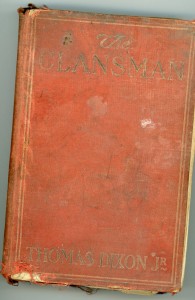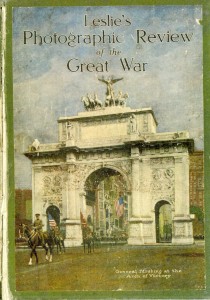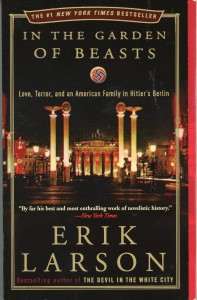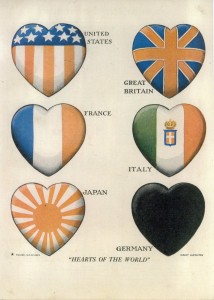#1047 – Dick Bernard: Three books at the lake.

We just returned from a week “up north” – for us, at a time share at Breezy Point Resort near Pequot Lakes MN. You’re not far from the “madding crowd” at a place like Breezy – “Elvis” does his thing, pretty expertly, each Saturday in the summer, but nonetheless it was a change of pace, and while we were watching Chris Olsen do Elvis, we saw a pretty nice sunset as well.
(click on all photos to enlarge)
But my leisure time was with my nose in three books I’d brought along:
1. “The Clansman“, by Thomas F. Dixon, a “romantic novel” of the horrors (to many) of the emancipation of negroes after the Civil War (1865 forward), and the attendant founding of the Ku Klux Klan. My copy was apparently 100 years old, a reprint of the 1905 original, apparently re-published in 1915 in synch with, and including a few pictures from, the release of the photo play “A Birth of a Nation”, based on the book.
2. A 1920 book, “Leslie’s Photographic Review of the Great War“, celebrating the great victory of the allies, particularly the U.S., over Germany’s “Huns” in WWI.
Both of these books were found in the detritus of my grandparents farm in North Dakota.
3. The 2011 book, “In the Garden of Beasts” by Erik Larson, a #1 New York Times bestseller, an “enthralling work of novelistic history” (front cover) about the new American ambassador to Germany in the first year of Hitler and the Third Reich, 1933-34.
This book was loaned to us by our friend Annelee Woodstrom, who grew up in Adolf Hitler’s Germany, and turned seven during 1933-34.
It would be a fool’s errand for me to attempt to review these books in a limited space.
Suffice, that I spent my week reading them all, and if one has any interest in tying threads together, of one event spawning another, yet another; and the useful scourge of labeling some collective “them” for the purpose of instilling fear in the collective “us”; or of “superior” and “inferior”; and of the insanity of feeling one can really “win” a “war”: taken together these three books give a huge amount of food for thought. They would be a powerful trilogy for a book club.
For just a single example, most are familiar with the deadly Nazi obsession with the ideal Aryan racial stock.
In The Clansman (United States, 1905), the first use of the word Aryan comes on page two, in a note to the readers from the author: “How the young South…against overwhelming odds…saved the life of a people…one of the most dramatic chapters in the history of the Aryan race.” There is no question, in The Clansman, as to who is superior, and who is hopelessly inferior….
Leslie’s…Great War is an almost rhapsodic account of the power of the United States in WWI with no consideration of the possible future consequences of humiliating Germany. One of many cartoons in the book (below) brings the notion of a world pecking order of nations home.
It is interesting to note the future of the relationships of those six powers after 1918 up to today.
Finally, In the Garden of Beasts lays the foundation of Nazi Germany and its rapid rise to power. It didn’t occur to me until I read the book that Hitler and the Nazi’s ascension to power in Germany coincided almost exactly with the arrival of Franklin Roosevelt in the White House, both in 1933.
There was a very steep learning curve…and easily exploited fears, about things real or imagined.
What do we learn from war?
We certainly don’t seem to learn that war means anything other than stoking flames leading to another war.
But war – at minimum the constant threat of war – seems to be the default position of our supposedly civilized society.


POSTNOTE:
For me the reading of The Clansman caused me to think about Haiti, the nation born of a revolt of slaves against France which gained independence in 1804, 17 years after the United States came into existence.
I was interested, while reading The Clansman, whether Haiti, a place and history which I know reasonably well, would appear in any form. Haiti was, after all, not a benign presence in the early U.S.; it was a state formed of slaves who had successfully revolted, not far from a nation, the U.S., much of whose economy depended on slave labor.
Sure enough, at page 291 of The Clansman, this quote from one of the actors: “In Hayti no white man can own land. Black dukes and marquises drive over them and swear at them for getting under their wheels. Is civilization a patent cloak with which law-tinkers can wrap an animal and make him a king?” Of course, “The issue…is civilization…whether Society is worth saving from barbarism.”
No wonder, The Clansman, to this day, is popular among White Supremacists. And the post Civil War southerners were terrified of slaves now free.
And there is still no freedom for Haiti.
July 28, 2015, marked another 1915 Centennial: when the United States occupied Haiti and took control for many years (some feel we still occupy it). This is another history worth revisiting. Here are a couple of links which can help: Ezilidanto, and Mark Schuller (Parts one and two of three).



Leave a Reply
Want to join the discussion?Feel free to contribute!